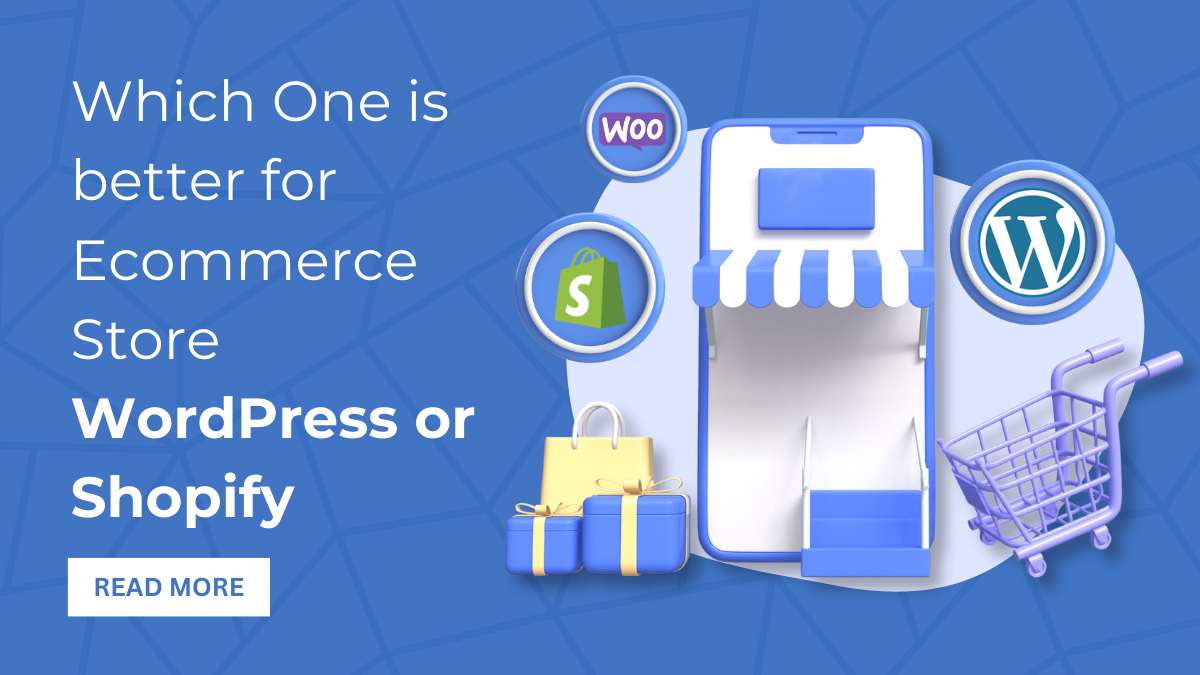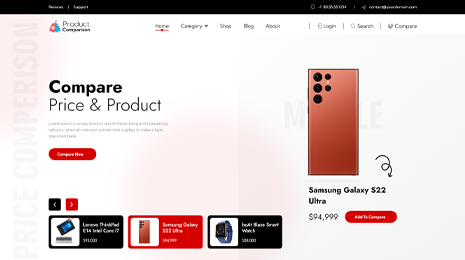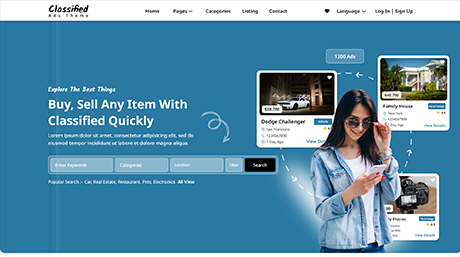When it comes to establishing an eCommerce store, the choice between WordPress or Shopify often sparks a debate. Both platforms offer unique advantages, catering to different needs based on individual preferences and business requirements.
WordPress, a highly customizable content management system, boasts a vast array of themes, plugins, and resources tailored for eCommerce. With its flexibility and extensive theme options, WordPress allows users to create a unique and personalized online store. To streamline this process further, our WordPress theme bundle presents a curated selection of premium WordPress themes specifically designed for eCommerce. These themes offer diverse functionalities, responsive designs, and compatibility with various plugins, making them a great choice for businesses seeking a customizable and scalable eCommerce solution.
On the other hand, Shopify provides an all-in-one platform dedicated solely to eCommerce. It offers a user-friendly interface, hosting, security, and built-in features that cater specifically to online selling. While Shopify simplifies the setup and management of an online store, it might have certain limitations in customization compared to WordPress.
Ultimately, the decision between WordPress and Shopify depends on your business goals, technical expertise, customization needs, and scalability requirements. Both platforms offer strengths that can be leveraged based on your eCommerce aspirations and preferences.
Advantages of WordPress or Shopify:
Benefits of Shopify:
- Simple and quick setup: Without any technical knowledge, Shopify offers everything you require to create an online store right out of the box.
- User-friendly: Shopify requires fewer steps in coding and configuration because it was created with novice site designers in mind.
- No maintenance is required: Shopify handles software changes, saving customers time and lowering the possibility that your website and workflow will be disrupted.
- Enhanced security: Shopify is completely compliant with PCI standards, which guarantees safe transactions using credit cards and lowers the possibility of hacking.
- Customer service: A Shopify subscription includes round-the-clock customer service that may be reached by email, live chat, or phone.
Benefits of WordPress:
- Customizability: Users can create a website using WordPress theme, which is a more versatile tool than Shopify.
- More themes are available: WordPress offers an enormous number of themes, both free and premium, so you’re able to have more control over the look and feel of your website.
- More plugins: You may add custom functionality to your online presence with the wide variety of plugins that WordPress offers.
- Advanced blog management system: WordPress has an advanced content management platform with improved blogging capabilities and revision history.
- Better technical SEO setup: WordPress can offer greater control over the process and deliver better technical SEO than Shopify when configured properly.
WordPress or Shopify which one is better:

I will start by describing the key distinctions between WordPress or Shopify, as well as why they prefer Shopify over WordPress and which I personally would choose overall. After that, I’ll contrast the two website builders’ costs, concepts, plugins, and techniques for creating a website.
WordPress or Shopify main differences are:
WordPress requires additional steps to create a website; Shopify builds websites faster.
Select a starting point, purchase a plan, create a website, add products, and begin marketing with Shopify. To use WordPress, one needs to purchase a domain name, locate reputable web hosting, select a theme, set up plugins, obtain a website builder, create an online presence, and begin advertising.
While WordPress does not impose any additional fees, Shopify applies fees for utilizing payment providers apart from Shopify Payments.
WordPress or Shopify both have great themes and plugins, but an average store requires a strong theme.
Comparison of Multi-Currency Options, Plugins, and Templates:
Great themes, plugins, and multi-currency choices are available on WordPress or Shopify.
Compared to WordPress stores, Shopify stores are simpler to manage.
WordPress is a superior choice for blogging purposes, despite the fact that Shopify has blogging features as well.
WordPress or Shopify are great website builders. But Shopify is a great option when you’re looking to build a website quickly and begin marketing right away. However, WordPress is a superior option when you’d like to create a website from the beginning to the end and have greater control over it. Spend fewer resources on website design and a greater amount of time on content creation and business marketing.
A comparison of Shopify and WooCommerce to determine which is the best eCommerce platform:

Advantages and disadvantages:
- Although Shopify is more costly, it is easy for beginners to use and offers outstanding customer service.
- Although WooCommerce is less expensive, it might be more challenging to operate and require expertise in technology.
- More flexibility is provided by WordPress and WooCommerce, but Shopify is superior for e-commerce.
- Whereas Shopify offers fewer yet verified apps, WordPress offers a greater number of free plugins.
Bullet points:
- The most affordable package on Shopify is $29 a month.
- WooCommerce charges yearly hosting and domain name costs. WooCommerce does not have transaction costs, whereas Shopify does. – There are more free plugins for WooCommerce and WordPress.
- Shopify excels in e-commerce, whereas WordPress shines in blogging and portfolio creation.
- If you’re looking for a user-friendly, well-supported e-commerce platform, go with Shopify.
- If you are financially savvy and possess technical expertise, go with WooCommerce.
- WordPress is more suitable for blogging and portfolios, while Shopify is more oriented towards e-commerce.
Complete Review of Shopify vs. WordPress WooCommerce—2023:
Ease of Use:
- Shopify, which was designed especially to create eCommerce website, is the most user-friendly.
- WooCommerce is a WordPress plugin that requires more setup time.
Customization:
- Shopify has limited flexibility; significant modifications need to be made by a developer.
- WooCommerce offers greater flexibility, along with less costly programmers.
Functionality:
- Shopify has limited options for additional pages and is mostly used for eCommerce.
- WooCommerce has all of WordPress’s capabilities, enabling more specific pages and eCommerce integration.
Maintenance:
- Shopify needs a little upkeep and changes.
- WooCommerce needs greater amounts of time for regular maintenance and updates.
Application:
- There are a similar number of useful apps on both platforms.
- Shopify apps need a subscription charge, but they are usually more reliable.
- WooCommerce apps have single payments and are less expensive.
Integrations:
- The majority of software providers have both platform connectors.
- Programmers typically begin by developing Shopify connectors.
Sales Channels:
- Integration with various sales channels is simple with Shopify.
- Integrating WooCommerce with sales channels takes extra work.
Payment Methods:
- There are many payment methods available on both platforms.
- Shopify benefits from having Shop Pay, which streamlines the checkout procedure for clients.
- There are advantages and disadvantages to both Shopify and WooCommerce.
- Before choosing a platform, take your eCommerce company’s specific needs into consideration.
WooCommerce vs. Shopify in 2023 Which is best for e-commerce?
My Story:
- Started making sales on Amazon
- Desired a personal website for expertise
- employed the WooCommerce plugin on WordPress
- I had difficulties with website personalization, fulfilment center integration, and the checkout procedure.
- Choose Shopify instead, and the transition was more positive.
Advantages and disadvantages:
WooCommerce:
- Free to begin with
- Totally adaptable
- Excellent for affiliate marketers and bloggers
Shopify:
- It is simple to add new items and variants.
- Easy checkout procedure
- Automated updating for plugins
- Customizable themes
- more suitable for people with no prior web development experience.
- relies on choices and individual results
- Take into account elements like price, customizability, and usability.
- Online retailers might think about utilizing accounting software such as Cinder.
Shopify vs WooCommerce 2023 (Don’t Choose Wrong!):
A platform that can assist you with setting up your online business, adding products, encrypting your customers’ data, managing orders, and loading very quickly is essential for creating a successful e-commerce website. We will contrast Shopify vs. WooCommerce in this post to help you select the platform that best suits what you need.
Shopify:
- controls 21 percent of e-commerce sites
- an all-encompassing setup platform that requires less than a day to set up.
- No technical expertise is necessary to handle security, caching, web hosting, etc.
- How to create a Shopify store: 14-day trial, domain name registration, product creation and import, theme selection, payment gateway and shipping setup, traffic building, and product sales
Advantages: fast setup, user-friendly, multiple lovely themes, hosting and security taken care of, easy drop shipping, outstanding client service, and responsive themes for mobile devices
Disadvantages include the inability to fully customize the store, lack of complete control over the web page, pricey premium apps, $29 monthly for the basic subscription, transaction fees, costly premium themes, and challenging search engine ranking.
WooCommerce:
- A WordPress e-commerce plugin that is open-source
- handles 28% of internet retailers
- To construct a WooCommerce store, follow these steps: import/make products, drive traffic, set up payment methods and shipping, install WordPress, install the WooCommerce plugin, select and customize a theme, and begin selling.
- Advantages include: free usage, full ownership over the website, free WordPress plugins and themes, improved blogging tools, improved SEO capabilities, the ability to dropship products and both digital and physical goods, services, and subscriptions.
- Cons: extensive learning curve, costly premium themes and plugins, needing to handle everything from infrastructure to security, potential security risks, and hosting as the primary expense.
Price:
Shopify offers a 14-day free trial. The basic plan costs between $29 and $200 per month, and a custom domain must be purchased separately.
WooCommerce is free to use but requires a domain name, hosting server, and SSL certificate, all of which can cost up to $90 annually. Fortunately, some suggested hosting companies offer savings every month as low as $3.99.
It really depends on your demands, but both systems are great. Shopify is a fantastic platform for anyone seeking an easy means to develop their online store while handling security and hosting. WooCommerce is excellent for people who want to create an online store without spending a lot of cash, have no restrictions, and have advanced blog features to rank well on Google.
Conclusion:
Shopify is an easy-to-use platform that doesn’t require any technical expertise to set up online stores quickly and easily. It guarantees safe transactions because it is easy to use and complies with PCI regulations. With a Shopify subscription, you can get phone, email, or live chat support whenever you need it. Conversely, WordPress has an enhanced technical SEO setup, greater customization options, a greater selection of Free or Premium WordPress themes and plugins, and an advanced blog administration system. WordPress offers a more flexible tool for building and maintaining online presences with its wide selection of themes, plugins, and sophisticated content management system. In terms of customer service, ease of use, and security, both platforms have advantages.













